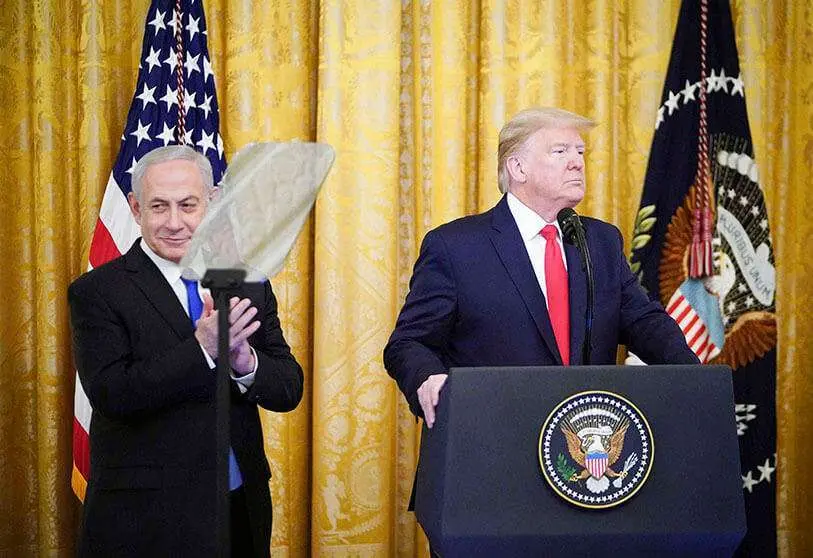The trap of the century

The “Deal of the Century”, which in Donald Trump's words was, and in my opinion is, "the Gift of the Century" from the United States to Israel, is about to become "the Trap of the Century" into which Israelis can fall by the hand of Benjamin Netanyahu. The terms of the coalition government formed on April 20 between Benny Ganz and "Bibi" Netanyahu provide for a rotation between the two in the post of prime minister for periods of 18 months, with Netanyahu in charge of the first. They also foresee that the prime minister can take to the government or even submit to parliamentary debate the annexation of 30% of the West Bank granted by Trump's plan, and Bibi has announced his intention to do so next July 2nd, without yet knowing which territories are the ones that Israel would annex: the Jordan Valley, the whole of the 128 settlements, only the 51 closest to the demarcation line where most of the settlers live, or even a combination of the three previous possibilities. Netanyahu is in a hurry to do so while Donald Trump occupies the White House (since he has already recognized his sovereignty over Jerusalem and the Golan Heights) and before the elections of November 3 that could be complicated by the consequences of the COVID-19 pandemic. And he doesn't want any surprises.
Be that as it may, Netanyahu's announcement is a veritable time bomb, the sinister ticking of which has been set in motion. There are many reasons for this.
The first one is that it makes any future agreement with the Palestinians virtually unworkable because it definitively puts to rest the possibility of two states, which has enjoyed international support for decades as the best diplomatic solution to the convoluted Israeli-Palestinian conflict, seventy years of unfriendly coexistence plagued by wars, occupations, uprisings and much suffering on both sides. In short, annexation is incompatible with peace.
The second is that it will make cooperation between the Palestinian Authority and the government of Israel impossible, a fact which, in the field of security, may well mean that it will be necessary to take military charge not only of the West Bank but also of Gaza, since irritation and frustration will make rocket attacks or terrorist actions inevitable and will put Israel's security at risk. And if Israel "takes over" five million Palestinians, it will have to decide whether to keep them in a ghetto or give them full rights. In the first case Israel would cease to be a democracy as it would apply an apartheid regime, and in the second case the Jewish identity of the Hebrew state would suffer. Both solutions are terrible.
The third consequence is that Israel's relations with countries as important to its security as Egypt, Jordan and the Persian Gulf monarchies will also suffer. The foreign minister of Jordan, a neighbouring country, the safest border and home to many Palestinians, has already warned that the Israel-Jordan peace treaty would go into the deep freeze. And so would the Egypt-Israel peace treaty, which is essential to control Hamas in Gaza, or whose collaboration is essential to neutralize terrorist attacks by al-Qaeda and what remains of the Islamic state on the Sinai Peninsula. As for the countries of the Persian Gulf, which in recent years have undergone a discreet process of rapprochement with Israel based on the fear they all have of Iran and the technological advantages they obtain from this relationship, allowing an Israeli annexation would place them in a very uncomfortable situation because, however fed up they all are with this endless conflict, they cannot let Tehran fly the flag for the defence of the rights of the Palestinians. It must be borne in mind that the rulers of all these countries without exception, which are not exactly representative democracies, have problems of legitimacy and cannot afford to distance themselves from the majority feeling of their peoples.
There are further complications because Trump's "deal of the Century" provides for such possible annexation by the West Bank under two preconditions: international consultations and prior approval ("full agreement") by the United States. Now, most of the European Union member countries would condemn the annexation, as would the Arab world, and the United States itself has passed congressional resolutions rejecting both "the unilateral annexation of territory" by Israel and unilateral proclamations of statehood by the Palestinians, even though the U.S. Secretary of State Mike Pompeo recently said that "Israelis will ultimately make those decisions," as if to imply that they would not prevent the annexation.
The measure, a flagrant violation of international law, may also face legal obstacles within Israel itself. According to Joel Singer, a Legal Advisor of the Israel Ministry of Foreign Affairs and chief negotiator of the Israel-PLO Declaration of Principles negotiated in Oslo, the decision falls within the scope of the Referendum Law of 2014 and would require a super-majority in parliament (80 out of 120 members) or 50 percent of Israeli voters in a referendum. For Singer this is "a poisoned pill".
And it is here that 220 prominent Israelis, including former Mossad directors such as Tamir Pardo, retired generals such as Gadi Shamni, and retired admirals such as Ami Ayalon, published an open letter in the Israeli press on April 3 urging Benny Ganz to block any attempt at annexation by citing Israeli security reasons. And a similar call was made a few days later by 149 American Jewish leaders, as well as 11 members of the US Congress. In their opinion, an annexation would risk the bipartisan support that Israel enjoys in Washington and could trigger a chain reaction of events beyond Israel's control.
That is why Donald Trump's "Deal of the Century" can become a trap, the poisoned pill of the century to Israel. For, as Plautus said, "we lose things certain in pursuing things uncertain".

